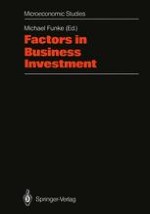1989 | OriginalPaper | Buchkapitel
Taxation and Capital Formation in West German Industries: A Q-Theory Approach
verfasst von : Michael Funke, Andreas Ryll, Dirk Willenbockel
Erschienen in: Factors in Business Investment
Verlag: Springer Berlin Heidelberg
Enthalten in: Professional Book Archive
Aktivieren Sie unsere intelligente Suche, um passende Fachinhalte oder Patente zu finden.
Wählen Sie Textabschnitte aus um mit Künstlicher Intelligenz passenden Patente zu finden. powered by
Markieren Sie Textabschnitte, um KI-gestützt weitere passende Inhalte zu finden. powered by
The purpose of this paper is to examine empirically the determinants of industry investment in West Germany. The traditional neoclassical theory of investment developed by Jorgenson1 among other economists does not provide a fully satisfactory explanation of the determinants of investment behaviour. The dissatisfaction is not based on the explanatory power of the estimated investment equations, rather the problems arise from the difficulty of interpreting the resulting lag structures. An alternative approach uses the so-called Q-theory of investment which is based on Tobin’s Q-concept and explicitly incorporates the cost of adjustment literature. The question whether this hypothesis is a better approximation to the behaviour of real-world investment has major substantive implications for both macroeconomic and financial economic theory and practice. This paper extends research in the area of the Q-theory of investment. Moreover, our contribution differs in two important respects from earlier studies of the Q-theory of investment in West Germany. First, all existing studies analyse investment behaviour at an aggregate level, i.e. for total industry or total manufacturing. We have also computed investment equations for broad sectors but, in addition, our analysis covers sixteen major industrial sectors out of total manufacturing separately. Secondly, contrary to other existing studies we have used tax-adjusted marginal Q-measures instead of unadjusted average Q-values. The article is organized as follows. The next section describes the investment model. The third and the fourth section review the historical trends in sectoral investment rates and Q-values and present the econometric specification and model. The final section contains a summary of our findings. In appendix I, II, and III abbreviations and computation methods are given.
